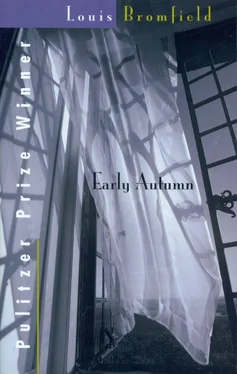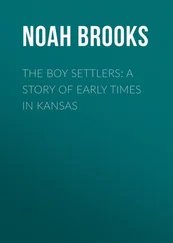Луис Бромфилд - Early Autumn - A Story of a Lady
Здесь есть возможность читать онлайн «Луис Бромфилд - Early Autumn - A Story of a Lady» весь текст электронной книги совершенно бесплатно (целиком полную версию без сокращений). В некоторых случаях можно слушать аудио, скачать через торрент в формате fb2 и присутствует краткое содержание. Год выпуска: 2014, ISBN: 2014, Издательство: The Wooster Book Company, Жанр: Проза, на английском языке. Описание произведения, (предисловие) а так же отзывы посетителей доступны на портале библиотеки ЛибКат.
- Название:Early Autumn: A Story of a Lady
- Автор:
- Издательство:The Wooster Book Company
- Жанр:
- Год:2014
- ISBN:978-1-59098-820-6
- Рейтинг книги:3 / 5. Голосов: 1
-
Избранное:Добавить в избранное
- Отзывы:
-
Ваша оценка:
- 60
- 1
- 2
- 3
- 4
- 5
Early Autumn: A Story of a Lady: краткое содержание, описание и аннотация
Предлагаем к чтению аннотацию, описание, краткое содержание или предисловие (зависит от того, что написал сам автор книги «Early Autumn: A Story of a Lady»). Если вы не нашли необходимую информацию о книге — напишите в комментариях, мы постараемся отыскать её.
Early Autumn: A Story of a Lady — читать онлайн бесплатно полную книгу (весь текст) целиком
Ниже представлен текст книги, разбитый по страницам. Система сохранения места последней прочитанной страницы, позволяет с удобством читать онлайн бесплатно книгу «Early Autumn: A Story of a Lady», без необходимости каждый раз заново искать на чём Вы остановились. Поставьте закладку, и сможете в любой момент перейти на страницу, на которой закончили чтение.
Интервал:
Закладка:
Together Bishop Smallwood and Aunt Cassie had planned a service calculated skillfully to harrow the feelings and give full scope to the vast emotional capacities of their generation and background.
They chose the most emotional of hymns, and Bishop Smallwood, renowned for his effect upon pious and sentimental old ladies, said a few insincere and pompous words which threw Aunt Cassie and poor old Mrs. Featherstone into fresh excesses of grief. The services for the boy became a barbaric rite dedicated not to his brief and pathetic existence but to a glorification of the name he bore and of all those traits—the narrowness, the snobbery, the lower middle-class respect for property—which had culminated in the lingering tragedy of his sickly life. In their respective pews Anson and Aunt Cassie swelled with pride at the mention of the Pentland ancestry. Even the sight of the vigorous, practical, stocky Polish women staring round-eyed at the funeral procession a little before, returned to them now in a wave of pride and secret elation. The same emotion in some way filtered back through the little church from the pulpit where Bishop Smallwood (with the sob in his voice which had won him prizes at the seminary) stood surrounded by midsummer flowers, through all the relatives and connections, until far in the back among the more obscure and remote ones it became simply a pride in their relation to New England and the ancient dying village that was fast disappearing beneath the inroads of a more vigorous world. Something of the Pentland enchantment engulfed them all, even old Mrs. Featherstone, with her poor back bent from washing to support the four defective grandchildren who ought never to have been born. Through her facile tears (she wept because it was the only pleasure left her) there shone the light of a pride in belonging to these people who had persecuted witches and evolved transcendentalism and Mr. Lowell and Doctor Holmes and the good, kind Mr. Longfellow. It raised her somehow above the level of those hardy foreigners who worshiped the Scarlet Woman of Rome and jostled her on the sidewalks of High Street.
In all the little church there were only two or three, perhaps, who escaped that sudden mystical surge of self-satisfaction. … O’Hara, who was forever outside the caste, and Olivia and old John Pentland, sitting there side by side so filled with sorrow that they did not even resent the antics of Bishop Smallwood. Sabine (who had come, after all, to the services) sensed the intensity of the engulfing emotion. It filled her with a sense of slow, cold, impotent rage.
As the little procession left the church, wiping its eyes and murmuring in lugubrious tones, the clouds which a little earlier had sprung up against the distant horizon began to darken the whole sky. The air became so still that the leaves on the tall, drooping elms hung as motionless as leaves in a painted picture, and far away, gently at first, and then with a slow, increasing menace, rose the sound of distant echoing thunder. Ill at ease, the mourners gathered in little groups about the steps, regarding alternately the threatening sky and the waiting hearse, and presently, one by one, the more timorous ones began to drift sheepishly away. Others followed them slowly until by the time the coffin was borne out, they had all melted away save for the members of the “immediate family” and one or two others. Sabine remained, and O’Hara and old Mrs. Soames (leaning on John Pentland’s arm as if it were her grandson who was dead), and old Miss Haddon in her black cape, and the pallbearers, and of course Bishop Smallwood and the country rector who, in the presence of this august and saintly pillar of the church, had faded to insignificance. Besides these there were one or two other relatives, like Struthers Pentland, a fussy little bald man (cousin of John Pentland and of the disgraceful Horace), who had never married but devoted himself instead to fathering the boys of his classes at Harvard.
It was this little group which entered the motorcars and hurried off after the hearse in its shameless race with the oncoming storm.
The town burial ground lay at the top of a high, bald hill where the first settlers of Durham had chosen to dispose of their dead, and the ancient roadway that led up to it was far too steep and stony to permit the passing of motorcars, so that partway up the hill the party was forced to descend and make the remainder of the journey on foot. As they assembled, silently but in haste, about the open, waiting grave, the sound of the thunder accompanied now by wild flashes of lightning, drew nearer and nearer, and the leaves of the stunted trees and shrubs which a moment before had been so still, began to dance and shake madly in the green light that preceded the storm.
Bishop Smallwood, by nature a timorous man, stood beside the grave opening his jewel-encrusted Prayer Book (he was very High Church and fond of incense and precious stories) and fingering the pages nervously, now looking down at them, now regarding the stolid Polish grave diggers who stood about waiting to bury the last of the Pentlands. There were irritating small delays, but at last everything was ready and the Bishop, reading as hastily as he dared, began the service in a voice less rich and theatrical than usual.
“I am the Resurrection and the Life, saith the Lord. …”
And what followed was lost in a violent crash of thunder so that the Bishop was able to omit a line or two without being discovered. The few trees on the bald hill began to sway and rock, bending low toward the earth, and the crape veils of the women performed wild black writhings. In the uproar of wind and thunder only a sentence or two of the service became audible. …
“For a thousand years in Thy sight are but as yesterday, when it is past, and as a watch in the night. …”
And then again a wild, angry Nature took possession of the services, drowning out the anxious voice of the Bishop and the loud theatrical sobs of Aunt Cassie, and again there was a sudden breathless hush and the sound of the Bishop’s voice, so pitiful and insignificant in the midst of the storm, reading. …
“0 teach us to number our days that we may apply our hearts unto wisdom.”
And again:
“For as much as it hath pleased Almighty God in His Providence to take out of the world the soul of our deceased brother.”
And at last, with relief, the feeble, reed-like voice, repeating with less monotony than usual: “The Grace of our Lord Jesus Christ and the Love of God and the Fellowship of the Holy Ghost be with us all evermore. Amen.”
Sabine, in whose hard nature there lay some hidden thing which exulted in storms, barely heard the service. She stood there watching the wild beauty of the sky and the distant sea and the marshes and thinking how different a thing the burial of the first Pentland must have been from the timorous, hurried rite that marked the passing of the last. She kept seeing those first fanatical, hard-faced, rugged Puritans standing above their tombs like ghosts watching ironically the genteel figure of the Apostle to the Genteel and his jeweled Prayer Book. …
The Polish grave diggers set about their work stolidly indifferent to the storm, and before the first motorcar had started down the steep and stony path, the rain came with the wild, insane violence, sweeping inward in a wall across the sea and the black marshes. Sabine, at the door of her motorcar, raised her head and breathed deeply, as if the savage, destructive force of the storm filled her with a kind of ecstasy.
On the following day, cool after the storm and bright and clear, a second procession made its way up the stony path to the top of the bald hill, only this time Bishop Smallwood was not there, nor Cousin Struthers Pentland, for they had both been called away suddenly and mysteriously. And Anson Pentland was not there because he would have nothing to do with a blackguard like Horace Pentland, even in death. In the little group about the open grave stood Olivia and John Pentland and Aunt Cassie, who had come because, after all, the dead man’s name was Pentland, and Miss Haddon (in her heavy broadcloth cape), who never missed any funeral and had learned about this one from her friend, the undertaker, who kept her perpetually au courant. There were not even any friends to carry the coffin to the grave, and so this labor was divided between the undertaker’s men and the grave diggers. …
Читать дальшеИнтервал:
Закладка:
Похожие книги на «Early Autumn: A Story of a Lady»
Представляем Вашему вниманию похожие книги на «Early Autumn: A Story of a Lady» списком для выбора. Мы отобрали схожую по названию и смыслу литературу в надежде предоставить читателям больше вариантов отыскать новые, интересные, ещё непрочитанные произведения.
Обсуждение, отзывы о книге «Early Autumn: A Story of a Lady» и просто собственные мнения читателей. Оставьте ваши комментарии, напишите, что Вы думаете о произведении, его смысле или главных героях. Укажите что конкретно понравилось, а что нет, и почему Вы так считаете.












